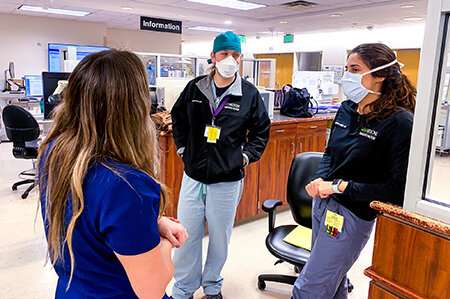Study shows high risk of anxiety, burnout in emergency department healthcare workers from COVID-19

Front-line health care workers in hospital emergency departments are at increased risk for anxiety, burnout, depression and post-traumatic stress disorder while coping with the COVID-19 pandemic, according to research published in Annals of Emergency Medicine in February. The study, done in 20 emergency departments at hospitals in the United States, found that symptoms of anxiety and burnout were prevalent across the full spectrum of emergency department staff during the pandemic, and as many as one-fifth of health care employees were at risk for PTSD.
The emergency department at the University of Alabama at Birmingham participated in the study, part of the COVID-19 Evaluation of Risks in Emergency Departments Project, or COVERED study.
A total of 1,606 medical professionals nationwide participated in the electronic survey, including 638 physicians, 410 nurses, 156 advanced practice providers and 402 non-clinical staff. Each participant self-reported their symptoms of anxiety and stress before and after being tested for anti-SARS-CoV-2 antibodies.
"This study presented four central findings that advance our understanding of the impact of the COVID-19 pandemic on the mental well-being of U.S. frontline E.D. personnel," said Walter Schrading, M.D., a professor in the UAB Department of Emergency Medicine and primary investigator at UAB for the study.
Findings:
- Self-reported feelings of work-related anxiety, emotional exhaustion and burnout are prevalent among all emergency department workers, including nurses and non-clinical personnel.
- Primary stressors include concerns about health care workers and patients infecting others with COVID-19 and the health of co-workers diagnosed with COVID-19.
- Over half of emergency department personnel reported one or more mental health symptoms of PTSD (e.g., nightmares), and nearly one in five screened positive for elevated PTSD risk.
- Most respondents, 54 percent, reported that their anxiety was diminished by learning their test results. This was a lower proportion of participants than those who predicted that antibody testing would decrease their anxiety, as 75 percent had anticipated a decrease in anxiety. This mitigating effect was especially pronounced among those who had a positive test for antibodies to COVID-19.
Of the 1,606 participants, 100 percent responded to the baseline survey and 88 to the follow-up survey. At baseline, approximately half reported symptoms of anxiety and burnout from their work, and 308 respondents, or 19.2 percent, screened positive for elevated PTSD risk. Female respondents were more likely than males to screen positive.
Common concerns included exposing their family to the virus and the health of co-workers diagnosed with COVID-19. After receiving antibody test results, 54 percent somewhat agreed, agreed or strongly agreed that knowledge of their immune status had decreased their anxiety. A positive serology result indicating prior SARS-CoV-2 infection was associated with a higher likelihood of reporting decreased anxiety.
"Emergency department personnel serve as the initial hospital caregivers for the majority of critically ill patients with known or suspected COVID-19 infection," Schrading said. "They also deal with many patients with undifferentiated symptoms consistent with COVID-19, whose SARS-CoV-2 test results are often unknown while in the E.D. This can lead to uncertainty of E.D. personnel regarding exposure to COVID-19 and secondary risk to their families. By clarifying exposure and risks, testing of health care workers may logically relieve anxiety, especially in those who test positive indicating some level of perceived immunity."
The authors report that their findings were remarkably consistent across all demographic groups and sites and suggest that following Centers for Disease Control and Prevention COVID-19 response plans for reducing anxiety and providing for serologic testing for emergency department personnel are important steps in maintaining good mental health among front-line health care professionals.
"Future work should focus on organizational efforts to prevent pandemic-associated stress to the extent possible through healthy work design and supportive workplace policies," Schrading said. "As health care workers continue to serve on the front lines in this pandemic, it is critical to explore ways to mitigate the long-term effects of chronic stress. Increasing provision of SARS-CoV-2 testing shows promise for achieving this aim."
More information: Robert M. Rodriguez et al. COVID-19-Related Stress Symptoms Among Emergency Department Personnel, Annals of Emergency Medicine (2021). DOI: 10.1016/j.annemergmed.2021.01.028



















